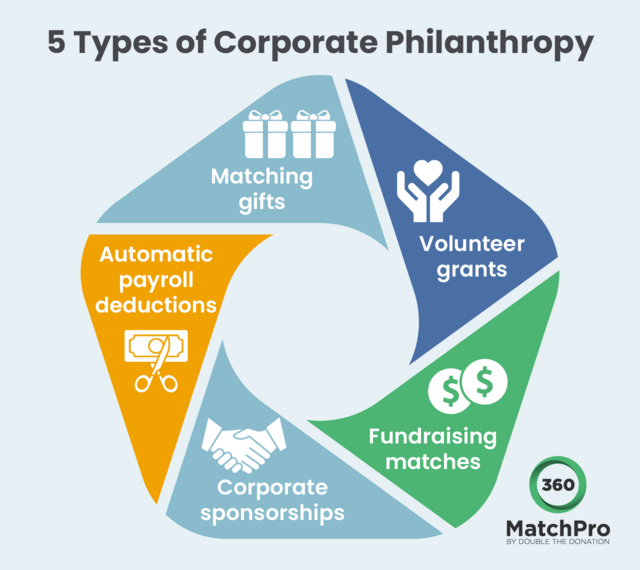Exploring Just How Corporate Philanthropy Shapes Brand Name Online Reputation and Client Loyalty
Business philanthropy significantly affects brand name track record and customer commitment. Firms that participate in authentic philanthropic initiatives commonly see a positive shift in just how consumers regard them. This positioning of values fosters trust and emotional connections with audiences. Nevertheless, the effectiveness of these humanitarian efforts can differ substantially. Comprehending what absolutely resonates with customers is necessary for brand names seeking to improve their social effect and market placement. What techniques will become important for future success?
The Development of Company Philanthropy
As companies significantly recognize their role in society, the development of company philanthropy has changed from mere philanthropic contributions to a tactical element of brand identity. Companies engaged in philanthropy mostly for tax obligation advantages or to enhance their public image. With time, this approach moved as stakeholders-- consisting of employees, investors, and clients-- demanded a much more genuine commitment to social duty.
Organizations started aligning their humanitarian efforts with their core worths and organization goals, bring about even more thoughtful and impactful contributions. This change has actually urged firms to invest in sustainable methods and neighborhood development, promoting a feeling of function that reverberates with customers.
Technical improvements have helped with transparency and interaction, enabling businesses to display their kind initiatives extra properly. Consequently, company philanthropy has become an important component of company strategy, with companies welcoming the opportunity to positively affect society while boosting their general brand narrative.
The Effect of Philanthropy on Brand Understanding
While companies take part in philanthropic initiatives to promote social good, these campaigns significantly shape brand understanding amongst customers. Company philanthropy can boost a brand's photo by connecting it with favorable social influence and neighborhood participation. Consumers commonly perceive brand names that actively get involved in charitable tasks as even more trustworthy and responsible. This assumption can affect acquiring choices, as consumers may prefer brand names that show a dedication to social problems.

Building Emotional Connections With Offering
Company philanthropy works as a powerful device for improving brand name identification by linking company worths with neighborhood demands. With critical giving, business can foster community engagement and create shared values that resonate with consumers on an emotional degree. This method not just reinforces brand name track record yet also develops lasting connections between businesses and their stakeholders.
Enhancing Brand Identification
They not only contribute to societal great yet likewise build deeper emotional links with their audiences when firms engage in philanthropic efforts. By straightening their brand name with charitable reasons, firms improve their identification and signal values that resonate with customers. This placement creates a story that goes past services and items, inviting consumers to take part in a shared mission. As customers significantly focus on purpose-driven brand names, companies that actively take part in providing can separate themselves in a congested market. Such campaigns foster a sense of commitment among customers who really feel directly attached to the brand's values. Eventually, corporate philanthropy comes to be a vital tool for boosting brand name identity, cultivating long lasting connections based on common beliefs and emotional involvement.
Fostering Area Interaction
Various research studies suggest that firms taking part in community-focused kind initiatives can substantially strengthen psychological links with their stakeholders. By buying neighborhood projects and supporting social causes, organizations grow a sense of belonging and count on within the community. This engagement fosters a positive brand name photo, as consumers appreciate business that show real concern for societal problems. Moreover, workers typically really feel extra inspired and honored to be associated with an organization that prioritizes area welfare. As an outcome, customers are more probable to create loyalty in the direction of brand names that actively add to purposeful reasons. Inevitably, cultivating area engagement with philanthropy not just boosts brand name track record but additionally builds long lasting emotional connections that benefit both the area and the business it offers.
Creating Shared Values
Just how can companies effectively create shared values that resonate with their stakeholders? Companies can accomplish this by aligning their humanitarian efforts with their core goal and the interests of their neighborhoods. By taking part in campaigns that resolve regional requirements, organizations cultivate emotional links with customers, enhancing brand commitment. Partnering with non-profits that reflect shared values enhances the brand's picture and shows dedication to social responsibility. Furthermore, transparent interaction about these efforts enables stakeholders to see the tangible impact of their contributions. Inevitably, by incorporating common worths into their corporate philanthropy, firms not just improve their online reputations yet additionally grow enduring relationships with consumers, resulting in raised commitment and count on. This placement is crucial in modern consumer decision-making.
Situation Studies: Effective Philanthropic Campaigns
Analyzing effective kind projects exposes different strategies that enhance brand name online reputation. Impactful community efforts, ingenious collaboration versions, and long-term interaction strategies have actually confirmed efficient in cultivating positive connections with consumers. These study highlight the significance of thoughtful corporate offering in accomplishing both social and organization goals.
Impactful Neighborhood Initiatives
Several business have efficiently leveraged kind campaigns to improve their brand reputation while making a significant effect in their communities. An innovation company introduced a digital proficiency program in underserved neighborhoods, offering training and resources that encouraged regional homeowners. This initiative not only added to area advancement yet also placed the business as a socially responsible leader. Similarly, a significant food firm implemented a hunger relief project, partnering with neighborhood nonprofits to disperse dishes to households in demand. This effort strengthened community ties and promoted consumer loyalty. Through these impactful initiatives, companies have shown their dedication to social duty, properly aligning their brand name worths with the needs of the areas they offer, inevitably enhancing their overall track record.
Ingenious Collaboration Models
The success of impactful community efforts frequently rests on ingenious partnership models that combine varied stakeholders to address complex social difficulties. Instance research studies illustrate how companies, non-profits, and federal government entities can team up efficiently. For circumstances, an international corporation partnered with a regional non-profit to release an education program, merging sources and know-how to improve area literacy rates. Another example entailed a technology firm and a medical care organization view it now signing up with forces to create a telemedicine option for underserved populaces. These collaborations not just enhanced the reach of philanthropic efforts however additionally strengthened the brands' credibilities by straightening their goals with area requirements. Inevitably, innovative collaboration models offer as a driver for significant adjustment and foster more powerful links between brand names and their consumers.
Lasting Engagement Techniques

Gauging the ROI of Corporate Social Duty
As firms increasingly purchase company social duty (CSR) campaigns, recognizing the roi (ROI) connected with these initiatives comes to be necessary. Gauging ROI in CSR is multifaceted, typically including both qualitative and measurable metrics. Financial returns can be evaluated with enhanced sales, boosted brand name commitment, and boosted staff member morale, which can cause greater performance. Furthermore, business may assess cost savings linked to lasting practices, such as lowered waste or energy intake.
Qualitatively, the impact of CSR on brand name online reputation can be evaluated via customer perception studies and social media sentiment evaluation. Surveys can supply insights into just how CSR activities affect consumer loyalty and depend on. Additionally, benchmarking versus sector standards can assist companies gauge their CSR efficiency. Eventually, a comprehensive technique to gauging ROI enables companies to make educated choices concerning future CSR investments, aligning techniques with both monetary efficiency and social influence
Customer Assumptions and Corporate Responsibility
Progressively, consumers expect business to run with a solid feeling of business duty, watching moral techniques as a requirement for brand name commitment. This change in assumption mirrors an expanding recognition of ecological and social concerns, leading consumers to prefer brand names that line up with their values. Consumers are much more inclined to support companies that take part in clear techniques, show sustainability, and contribute favorably to their areas.
Social media intensifies these assumptions, enabling consumers to share their experiences and point of views swiftly. Brands that fall short to satisfy these ethical requirements run the risk of reaction, while those that accept corporate obligation frequently enjoy superior credibility and consumer loyalty. As customers demand liability, business must integrate company social obligation right into their core methods, prioritizing honest actions not just as a marketing method, but as an essential aspect of their operations. This placement can ultimately bring about stronger brand fondness and sustained success in competitive markets.
Future Fads in Corporate Philanthropy and Brand Name Commitment
The landscape of corporate philanthropy is progressing, affected by the increased customer expectations bordering corporate obligation. Companies are progressively incorporating social influence into their core service strategies, not merely as a supplementary activity. Future fads show a shift toward transparency, with brand names sharing thorough information about their humanitarian campaigns and their straight effects on areas.
Additionally, modern technology is playing a vital function, making it possible for check this real-time involvement in between brands and consumers. Social media site systems assist in straight interaction, enabling customers to voice their expectations and hold brands responsible. Additionally, younger generations, particularly Millennials and Gen Z, prioritize sustainability and moral techniques, driving organizations to take on even more diligent techniques.
As business philanthropy becomes synonymous with brand identification, firms that authentically align their objectives with societal demands are most likely to promote stronger customer commitment. This merging of worths will inevitably form the future of business credibility and consumer partnerships in a significantly conscientious marketplace.
Regularly Asked Inquiries
Exactly How Do Consumers Discover a Business's Philanthropic Efforts?
Customers find a company's kind efforts through numerous channels, consisting of social networks, news release, community events, and word-of-mouth. These avenues facilitate recognition, enabling people to engage with brand names that line up with their interests and worths.
What Function Does Staff Member Involvement Play in Company Philanthropy?
Worker participation in business philanthropy enhances interaction, fosters a sense of possession, and enhances group cohesion - corporate philanthropy. This engagement frequently intensifies the effect of philanthropic efforts, resulting in higher recognition and support for the business's philanthropic efforts
Can Corporate Philanthropy Backfire on a Brand name's Reputation?
Business philanthropy can certainly backfire on a brand's online reputation if perceived as opportunistic or insincere. Adverse public perception may emerge, resulting in diminished trust and loyalty among customers that focus on authenticity in corporate actions.
Are Smaller Sized Business as Efficient in Philanthropy as Larger Companies?
Smaller sized firms can be equally effective in philanthropy as larger companies, usually demonstrating agility and authenticity. Their localized efforts may reverberate more deeply with communities, fostering authentic connections in spite of restricted sources compared to their larger counterparts.
Exactly How Can Business Select the Right Triggers to Assistance?
Business can select the ideal bring on by straightening their worths with neighborhood requirements, examining stakeholder rate of interests, and examining prospective effect. This calculated strategy cultivates credibility, try this improves interaction, and enhances connections with customers and the more comprehensive area.
While firms involve in humanitarian initiatives to advertise social excellent, these efforts considerably shape brand perception amongst customers. As consumers increasingly focus on purpose-driven brand names, companies that actively involve in providing can distinguish themselves in a congested market. Many firms have successfully leveraged philanthropic campaigns to boost their brand reputation while making a purposeful influence in their neighborhoods. Increasingly, consumers expect companies to operate with a solid sense of company duty, seeing ethical techniques as a prerequisite for brand name loyalty. As company philanthropy becomes identified with brand identity, business that authentically align their objectives with societal requirements are likely to promote stronger client loyalty.